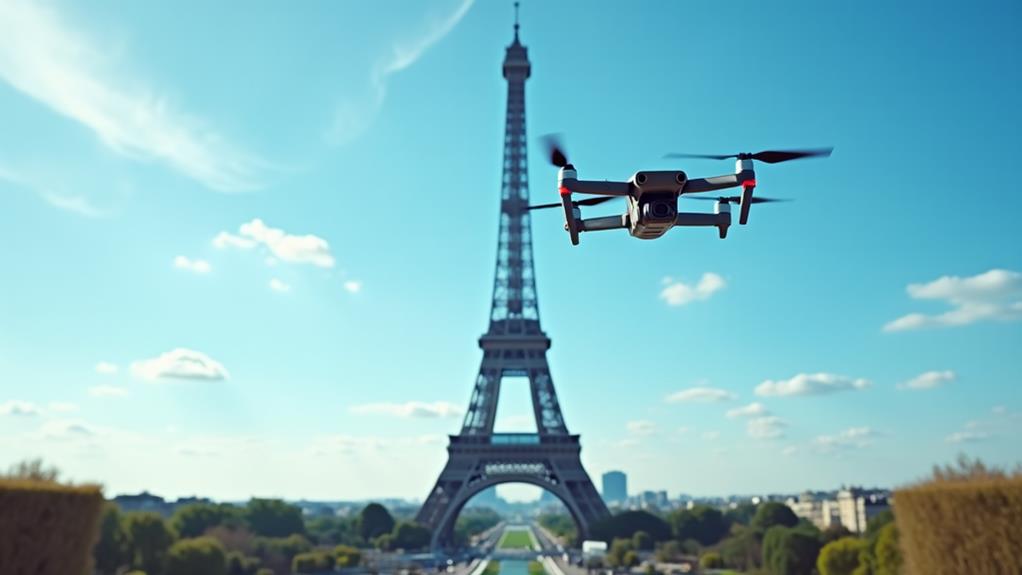
You may think that flying a drone in France is a breeze, but think again. With the country's strict regulations, you'll need to do your homework before taking to the skies. Registration is just the beginning – you'll need to account for your drone's weight and classification, and obtain necessary authorizations to avoid legal repercussions. And that's not all – no-fly zones, pilot certification, and night flight restrictions are just a few of the other considerations you'll need to make. So, what else do you need to know to fly your drone safely and legally in France?
Contents
Key Takeaways
- Drones over 800g or with a camera require registration in France, regardless of weight, and operators must create a DGAC account and provide required documents.
- Certain areas in France are no-fly zones, including airports, national parks, military bases, and nuclear facilities, and pilots must familiarize themselves with these zones.
- Drone pilots in France must hold a certification, obtained through a theoretical exam, to operate a drone legally and responsibly.
- Drone weight and classification affect certification requirements and operating procedures, with light, medium, and heavy drones having different regulations.
- Night flights are restricted in France, and pilots must obtain specific authorization from the DGAC to fly at night, with online tools available to plan flights accordingly.
Drone Registration Requirements
You must register your drone in France if it weighs more than 800 grams or is equipped with a camera or sensor, regardless of its weight. This registration is mandatory for both recreational and professional drone pilots.
To conform, you'll need to create an account on the French Civil Aviation Authority's (DGAC) website and provide required documentation, such as proof of identity and proof of ownership.
Once registered, you'll receive a unique identification number that must be affixed to your drone. You'll also need to pay an operator fee, which varies depending on the type of drone operation.
Additionally, you may want to ponder insurance options to protect yourself and others in case of an accident. Familiarizing yourself with France's drone regulations is vital to avoid fines and guarantee safe drone operations.
Registering your drone is a critical step in complying with French drone laws, and failure to do so can result in penalties. By understanding the registration requirements, you can verify a smooth and legal drone operation in France.
No-Fly Zones in France
In France, certain areas are strictly off-limits to drones, and knowing this beforehand is vital to familiarize yourself with these no-fly zones to avoid legal repercussions. You'll need to steer clear of these restricted areas to guarantee a safe and legal flight.
Here's a breakdown of the no-fly zones in France:
| Restricted Area | Reason for Restriction | Specific Locations |
|---|---|---|
| Airports | Airport restrictions for safety and security | All commercial airports, including Paris Charles de Gaulle and Orly |
| National Parks | Environmental protection and wildlife preservation | Écrins National Park, Vanoise National Park, and others |
| Military Bases | National security and defense | Various military bases across the country |
| Nuclear Facilities | Safety and security concerns | Nuclear power plants and research facilities |
Drone Pilot Certification
France's no-fly zones serve as a foundation for responsible drone operation, but they're only half the story.
As a drone pilot, you're required to hold a certification to operate a drone in France. This certification, also known as a "certificate of competence," is issued by the French Civil Aviation Authority (DGAC) upon completing a theoretical exam.
To prepare for the exam, you can take drone courses online, which cover essential topics such as airspace regulations, weather conditions, and safety procedures.
These courses are designed to equip you with the necessary knowledge to operate a drone safely and efficiently.
In addition to certification, you're also advised to weigh pilot insurance options.
This insurance provides financial protection in case of accidents or damages caused by your drone.
With a valid certification and adequate insurance, you'll be well-equipped to operate your drone in compliance with France's drone laws.
Drone Weight and Classifications
Here's a breakdown of the drone categories and their corresponding payload limits:
| Drone Category | Maximum Takeoff Weight (MTOW) | Payload Limit |
|---|---|---|
| Light | ≤ 25 kg | ≤ 5 kg |
| Medium | > 25 kg and ≤ 150 kg | ≤ 25 kg |
| Heavy | > 150 kg | No specific limit |
Keep in mind that these categories also affect the type of certification you'll need, as well as the operating procedures you'll need to follow. Make sure you understand the regulations that apply to your drone's category to avoid any legal issues or penalties.
Night Flight Restrictions
Safety considerations dictate that drone operations be restricted during certain times of the day.
As a drone operator in France, you need to be aware of the night flight restrictions to guarantee Airspace Safety. You're not allowed to fly your drone between sunset and sunrise, unless you've obtained a specific authorization from the Directorate General for Civil Aviation (DGAC).
This restriction applies to all drone categories, including recreational and professional drones.
When planning your flight, you must take into account the time of day and the airspace restrictions in place.
You can use online tools or flight planning apps to determine the exact times of sunrise and sunset for your location. Additionally, you should always check the local weather forecast and air traffic control notifications to confirm a safe and compliant flight.
Frequently Asked Questions
Can I Fly My Drone Over Beaches in France?
You can't fly your drone over beaches in France without restrictions; coastal areas often have public access limitations, so it's vital to verify local authorities' rules and regulations to guarantee you're not violating any privacy or security concerns.
Can I Use My Drone for Commercial Photography?
When using your drone for commercial photography, you'll need to obtain French permits and certify you have aerial authorization, as you'll be operating for profit, and strict regulations govern commercial drone use in France.
Do I Need Insurance to Fly a Drone in France?
Oh, you're asking about insurance? Ha! You're worried about covering your drone, not the existential dread of a lawsuit. Seriously though, you'll want drone coverage options to mitigate liability concerns, so get insured – it's not optional, it's essential.
Can I Fly My Drone Near Airports in France?
When flying your drone in France, you'll need to respect airspace restrictions and avoid no-fly zones, especially around airports, where strict regulations apply; you're prohibited from flying within a 5-kilometer radius of airport boundaries.
Can I Fly a Drone While in Motion in France?
As you navigate France's winding roads, you're likely wondering if you can fly your drone while in motion, capturing the rustic charm of rural exploration. Unfortunately, you'll need to keep your drone grounded, as flying from a moving vehicle is strictly prohibited in France.
Conclusion
As you prepare to take to French skies, remember that compliance is key. Like a puzzle, each piece of regulation fits together to guarantee a safe and enjoyable flying experience. Don't let your drone dreams crash-land due to ignorance – register, get certified, and respect no-fly zones. By doing so, you'll soar through France's drone laws like a pro, with the confidence that comes from knowing you've checked all the right boxes.





